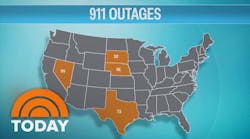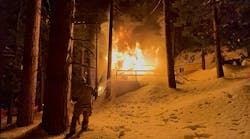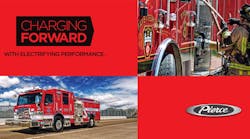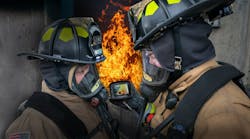The TI Training column in January's Firehouse Magazine addresses outside training resources. A formal program by a state or regional training organization is a great resource, especially since it is a recognized standard for your area. Not every state or region has an academy, and even those with academies may not have developed TI training programs. Distance and travel expenses can also make the regional fire center too expensive to be a realistic option. Frequently, that means a fire department must turn to a private company for training.
Standards...What Standards?
The biggest hindrance in TI training is the lack of national standards. The Law Enforcement Thermographers Association is the recognized standard in law enforcement, as the DEA, FBI and Royal Canadian Mounted Police all subscribe to the LETA training programs. Other companies, such as ITC, meet industrial standards that reflect maintenance and scientific needs. The fire service, though, doesn't need Constitutional law, probable cause or friction loss equivalents in ball bearings (hard to believe anyone really needs that last one, huh?). We need to know about performing good, safe searches in buildings on fire; we need to know if and when our thermal imagers will show product levels at hazmat scenes; we need to know what pre-flashover conditions look like on a thermal imager.
The universal standard in the fire service is the NFPA. Unfortunately, the NFPA has not tackled the issue of what qualifies as competent TI training. Some of you may be thinking, "Thank goodness!" After all, the NFPA has told us that our airpacks have to weigh 10 pounds more than they did 10 years ago and cost twice as much. They've also told us that a leather helmet has to weigh six pounds to provide appropriate protection...five pounds won't cut it! But for all the pooh-poohing that the NFPA suffers, the reality is that the NFPA standards are designed to protect the firefighter and the fire service. Better gear protects firefighters from hostile situations, while common standards ensure minimum, measurable levels of performance. That means fire departments don't buy nylon turnouts just because they are low-bid.
The lack of an NPFA standard in TIs means that private companies can sell themselves as TI trainers, without having to meet any basic requirements. And that can be bad for you, as it removes one of the basic means for determining if the people you are about to hire meet a minimum standard.
What To Look For?
First and foremost, don't be wowed by pedigree. By that, I mean, just because a firefighter worked for a top-notch fire department doesn't mean he was a top-notch firefighter. Think of the big city near you that is sort of the local "gold standard" of the fire service. For every awesome firefighter you know in that fire department, there are probably three average ones and one bad one. It's the common bell curve of human life, and the prestigious departments are no more immune to it than you or your neighbor.
Also, just because a firefighter has a lot of fire experience does not mean he has a lot of thermal imaging experience. Many large cities are just now incorporating TIs into their regular operations. Others have had TIs for years, but they were rarely used or thinly distributed. So, just because someone served 25 years on the busiest truck company in XYZ Fire Department doesn't mean he knows much about thermal imaging. His experience with a TI could have been limited to the introductory class he sat through the year before he retired. While you don't want to be blinded by an instructor's pedigree, the reality is that firefighting experience matters...especially when you are teaching other firefighters. We want to be taught by people who have "walked the walk," not just "talked the talk."
So there is a fine line here...experience does matter, but it is not the primary consideration. TI experience and knowledge is critical, and don't assume that someone has it just because his department has a TI. So, you have to ask questions. Ask about the instructor's fire experience, as well as his TI experience. A guy with five years on the largest fire department in the state, and five years of studying and using TIs, is more valuable as an instructor than a guy with 30 years on the largest fire department in the region, but only used a TI occasionally as a battalion chief his last two years.
Trust but Verify
In addition to asking specific questions about the instructor, ask specific questions about the program. Ask for an outline or syllabus. An organized training outfit will be able to give you a relatively in-depth agenda for the program. An experienced trainer will even be able to tell you how long your program will last. Then once you get all of this, ask for references.
Don't just ask for references...call them. Make sure these are fire departments that have used the same instructor that is being sent to your department. Ask the reference about the instructor's ability and knowledge. Ask about the support materials the instructor used (i.e., the PowerPoint and videos) as well as any handouts that the instructor might have given to students. In short, get another customer's opinion of the program. And ask them the most important question of all: "Did you get your money's worth and would you recommend that I hire them?" What is said, or not said, in response to that question can be very revealing.
Conclusion
Choosing a private company to train your department can be an easy way to get quality training for your department. However, you will have to do some work to ensure that you hire the best team you can afford. The lack of national fire standards makes it difficult for departments to compare training companies, so you will need to ask a lot of questions and call a few references to be sure you get quality training at a reasonable price.
Be safe.
Jonathan Bastian is a Thermal Imaging Specialist for Bullard. He is certified as a thermal imaging instructor by the Law Enforcement Thermographers' Association (LETA). He is also the author of the FD Training Network "FireNotes" book, Thermal Imaging for the Fire Service. Bastian served 12 years on the North Park, IL, Fire Department, including the last three as a captain. He has taught classes on thermal imaging, rapid intervention teams and search and rescue operations. He is currently a police officer in Lexington, Kentucky. If you have questions about thermal imaging, please send them to [email protected].





